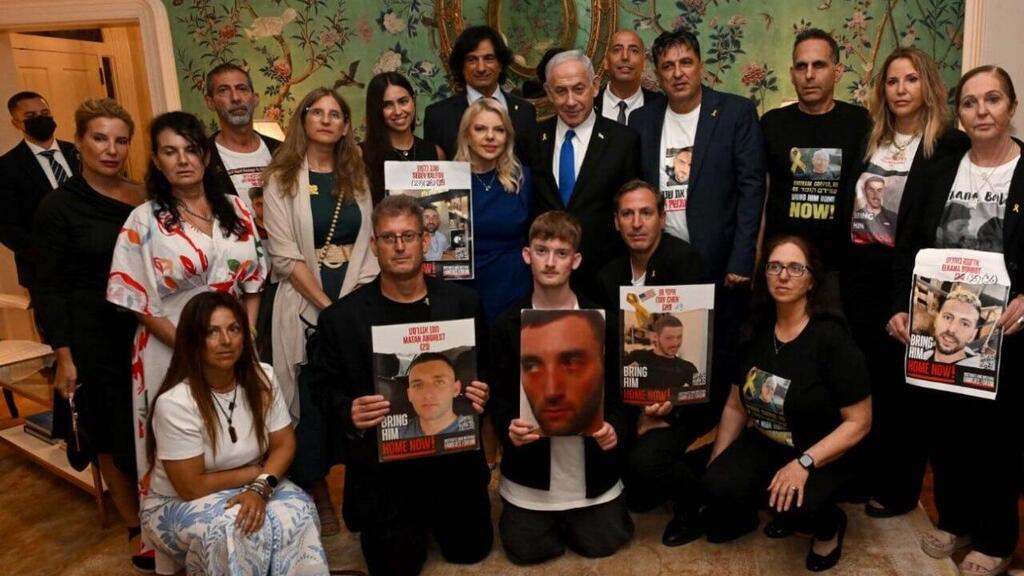4 View gallery


Prime Minister Benjamin Netanyahu and his wife, Sara Netanyahu, met in Washington with families of the hostages
(Photo: GPO)
Hagai described a meeting between the families and the deputy of Adam Boehler, President Trump’s special envoy on hostages. “He told us clearly that the first phase is just the beginning, and immediately after that, they’ll discuss ending the war,” said Angrest. “All the senior officials said the same thing, and the prime minister repeated it: for the first time, there’s a real discussion about ending the war once the hostages are freed.”
“There was huge pressure,” Hagai continued. “They told us President Trump wants peace and wants to stop this madness. We even considered delaying our return flight until Tuesday because we heard Trump isn’t letting Netanyahu leave until there’s a deal. We were already checking options to change our flight, but then the Prime Minister’s Office said the delegation is leaving on Thursday, so we stayed. We just hope this doesn’t collapse like past deals. We can’t afford to get stuck on minor details.”
He added: “We told the prime minister we know he knows how to stand firm—so now it’s time to be firm on this deal. He must insist on Matan, who is a soldier, seriously wounded, and should have been home a long time ago. Matan has done so much for this country. He saved lives. He’s in a dire humanitarian situation. We asked Netanyahu to correct this injustice and bring him back. Otherwise, there won’t be anyone left to bring back. He won’t survive.”
Angrest also revealed that Matan’s emergency kit bag was recently found in southern Gaza and returned to his mother, Anat. “It was his readiness bag, filled with gear in case of war. Soldiers found it near Rafah, ot even where Matan was captured. They sent us a photo, and I told them, ‘That’s the bag I bought him as a child.’ It was torn, battle-scarred, burned—clearly went through hell. But we don’t want his belongings. We want Matan himself.”
As negotiations continue, Hagai noted that the families were told talks with Hamas have not collapsed: “We got an update yesterday from the Hostage Families Forum that talks are still ongoing. As far as they’re concerned, the deal isn’t stuck. I hope tonight something will finally move forward. They’re already discussing names—not just whether there will be a deal.”
Disputes in the hostage talks: “They’re Hamas’s bargaining chips”
Later Sunday, Netanyahu was expected to hold a meeting on a new proposal to be presented to Hamas, focusing on two unresolved issues: where the IDF would remain deployed in Gaza during a ceasefire, and how humanitarian aid would be delivered.
On Saturday, a day after returning from Washington, Netanyahu met with Finance Minister Bezalel Smotrich. Though the two had spoken several times during the trip, this time Netanyahu reportedly tried to ease resistance within his coalition to any hostage deal that includes a 60-day ceasefire. Smotrich has threatened to leave the government if he doesn’t receive assurances that the fighting in Gaza will resume after the ceasefire ends.
Nadav Miran—the brother of kidnapped civilian Omri Miran—cautioned against premature optimism. “The expectations are overblown. We need to let things develop,” he said. “It’s too soon to celebrate or get ahead of ourselves. Let the details solidify first. Only then should we talk about a deal—if it happens. I’m not crushed if it doesn’t, because it doesn’t guarantee my brother’s release.”
Miran criticized the current deal, calling it flawed like previous partial agreements: “This will cost us in soldiers’ blood when we have to fight to free the second half. We should abandon this deal altogether. Hamas is obstructing it, demanding a full IDF withdrawal before they release all the hostages. Meanwhile, Israel says Hamas must go. So what now?”
He urged Israeli leaders to flip the narrative: “Why aren’t we demanding a deal for everyone? Hamas says, ‘Let’s do a deal for all the hostages,’ and Israel says, ‘No, we’re fine with half—we’ll talk about the rest later.’ This approach will not bring the hostages home. Hostages are Hamas’s only bargaining chip. If we release 25 now, what then? We need to ask our leaders why they won’t pursue a deal for all. Let them explain that to the public.”

